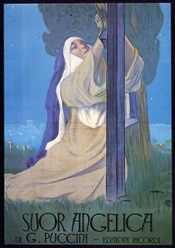
21 Dec 2008
PUCCINI: Suor Angelica — La Scala 2008
Suor Angelica: Opera in one act (no.2 of Il trittico).
Mozart and Salieri, an opera in one act consisting of two scenes.
Nicolai Rimsky-Korsakov (1844-1908), composer. Libretto derived from Alexander Puskhin's play of the same name.
First performance: 7 December 1898 in Moscow.
Ariadne auf Naxos, Oper with a prologue and one act. Music composed by Richard Strauss. Libretto by Hugo von Hofmannsthal.
La Vestale, a tragédie lyrique in three acts.
Boris Godunov, an opera in four acts with prologue
Modest Mussorgsky, composer. Libretto by the composer, based on Alexander Pushkin's drama Boris Godunov and Nikolai Karamazin's History of the Russian Empire
First performance: 8 February 1874 at the Mariinsky Theatre, St. Petersburg
Il Trovatore, dramma in four parts.
Only a few months following the premiere of Der Rosenkavalier, Hugo von Hofmannsthal proposed a new opera to Richard Strauss based on Molière’s comedy-ballet, Le Bourgeois gentilhomme (in German, Der Bürger als Edelmann).
Die Entführung aus dem Serail, Singspiel in 3 Acts.
Music composed by Wolfgang Amadeus Mozart (1756–1791). Libretto by Johann Gottlieb Stephanie the Younger, based on an earlier libretto by
Christoph Friedrich Bretzner.
Die Entführung aus dem Serail, Singspiel in 3 Acts.
Music composed by Wolfgang Amadeus Mozart (1756–1791). Libretto by Johann Gottlieb Stephanie the Younger, based on an earlier libretto by
Christoph Friedrich Bretzner.
Arabella: Lyrische Komödie in three acts
Die Entführung aus dem Serail, Singspiel in 3 Acts.
Music composed by Wolfgang Amadeus Mozart (1756–1791). Libretto by Johann Gottlieb Stephanie the Younger, based on an earlier libretto by
Christoph Friedrich Bretzner.
La Gioconda, dramma lirico in four acts.
Music composed by Amilcare Ponchielli (1834–1886). Libretto by Arrigo Boito (under the pseudonym Tobia Gorrio), based upon Victor Hugo's Angelo, Tyrant of Padua (1835).
Don Carlo, an opera in four acts. Music composed by Giuseppe Verdi (1813–1901). Libretto by Joseph Méry and Camille Du Locle after Friedrich von Schiller’s dramatic poem Don Carlos, Infant von Spanien. Revised version in four acts (French text revised by Du Locle, Italian translation by Achille de Lauzières and Angelo Zanardini).
Un ballo in maschera, a melodramma in three acts.
Music composed by Giuseppe Verdi. Libretto by Antonio Somma, based upon the work of Eugène Scribe Gustave III ou Le bal masqué (1833)
Medea: Melodramma tragico in three acts.
Die Tote Stadt, an opera in three acts.
Music composed by Erich Wolfgang Korngold (1897-1957). Libretto by Paul Schott (Julius and E. W. Korngold) after the novel Bruges la morte by Georges Rodenbach.
Some Details concerning the Revolution inaugurated by Rossini
Manon Lescaut, dramma lirico in quattro atti
Elektra: Tragedy in one act.
Lyric Opera of Chicago has announced both schedules and cast-lists for is Spring 2020 performances of Richard Wagner’s Ring Cycle. Given the series of individual productions already staged by the company since Fall 2016, that pave the way for the complete cycle, Lyric Opera of Chicago’s complete production should affirm the artistic might of the great composer.
“Diacono himself does not know what musical talent he possesses” – Mascagni

Suor Angelica: Opera in one act (no.2 of Il trittico).
Streaming Audio
Composed by Giacomo Puccini. Libretto by Giovacchino Forzano.
First Performance: 14 December 1918, Metropolitan Opera, New York
| Principal Roles: | |
| Suor Angelica | Soprano |
| La Zia Principessa [The Princess, her aunt] | Contralto |
| La Badessa [The Abbess] | Mezzo-Soprano |
| La Suora Zelatrice [The Monitress] | Mezzo-Soprano |
| La Maestra delle Novizie [The Mistress of the novices] | Mezzo-Soprano |
| Suor Genoveffa | Soprano |
| Suor Osmina | Soprano |
| Suor Dolcina | Soprano |
| La suora infermiera [The nursing sister] | Mezzo-Soprano |
| Le cercatrici [The alms sisters] | Soprano and Mezzo-Soprano |
| Le novizie [The novices] | Soprano and Mezzo-Soprano |
| Le converse [The lay sisters] | Soprano and Mezzo-Soprano |
Setting:The courtyard of a convent, towards the end of the 17th century
Synopsis:
As the nuns talk and attend to their duties, the question of earthly desires is raised. Suor Genovieffa confesses that she would love to hold a lamb again and Suor Dolcina longs for rich food. Suor Angelica says that she has no unfulfilled wishes, but her colleagues do not believe her, as they know she has been longing to hear from her noble family for seven years, since she had been forced to enter the convent. One of the sisters has been stung by a wasp and Angelica, who has extensive herbal know-ledge, provides the appropriate medication. Two nuns who have been out in the world in search of food report that a fine carriage is outside the gates, but are unable to answer Angelica’s questions about its coat of arms. She is summoned by the abbess: her aunt the princess has come to see her, not from sympathy but because, as the legal guardian of Angelica and her sister Anna Viola, she needs Angelica’s signature to a document. Anna Viola is to be married, to a man, she adds harshly, who has forgiven the stain on the family honor caused by Angelica’s sin.
Angelica longs for news of her baby son, but is told that he had died. Left alone in her grief, she mixes a fatal brew and drinks it. Realising that she has committed a mortal sin, she prays for forgiveness. As she dies she sees a vision of the Virgin leading her child to her.
[Synopsis Source: Opera~Opera]